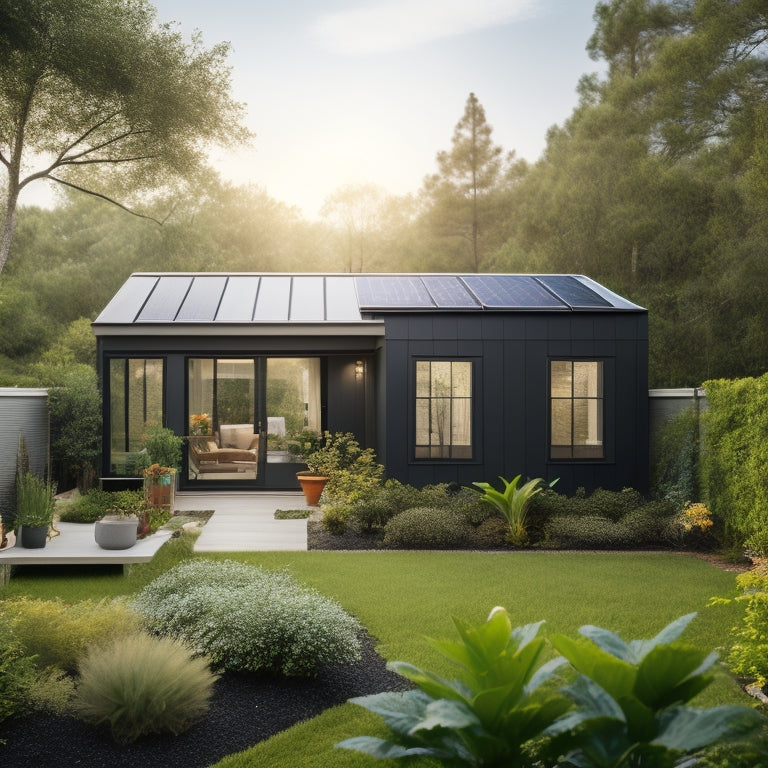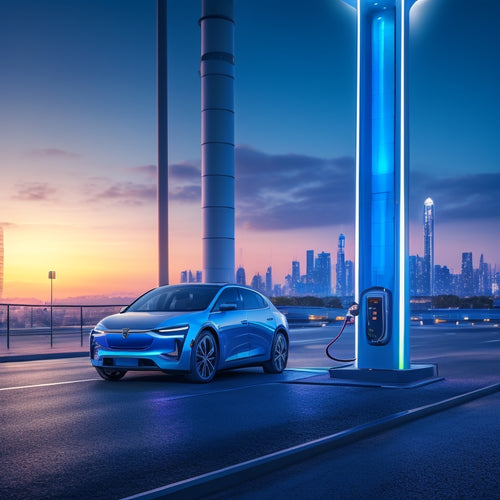
10 Essential Tips for Small Home Solar Installation
Share
As you prepare for small home solar installation, you'll need to assess your energy needs first and choose the right solar panel size. Reflect on your roof's condition and guarantee proper system sizing. Inspect for shading issues and plan for energy storage options. Research local building codes and select a reputable installer. Understand your warranty options to secure a successful installation. From manufacturer certifications to regulatory compliance, there are many factors to contemplate. By following these essential tips, you'll be well on your way to harnessing the power of solar energy - and there's more to explore to guarantee a seamless installation process.
Key Takeaways
• Calculate energy consumption and conduct an audit to determine the right solar panel size and system configuration for your small home.
• Assess your roof's condition, age, and durability to ensure it can support the solar panel system and withstand environmental factors.
• Research and vet potential installers carefully, confirming their credentials, certifications, and compliance with industry standards.
• Optimize energy efficiency by addressing shading issues, planning for energy storage, and ensuring compliance with zoning regulations and net metering laws.
• Invest in high-quality equipment meeting industry standards, and consider warranty options for solar panels and inverters to ensure optimal performance.
Assess Your Energy Needs First
Before investing in a small home solar installation, ascertain your energy needs by calculating your average daily energy consumption in watt-hours (Wh) to guarantee you install a system that meets your requirements. This vital step helps you determine the size of the solar panel system you need, ensuring you produce enough electricity to power your home efficiently.
Conducting an energy audit is an excellent way to assess your energy needs. This thorough examination of your energy usage patterns helps identify areas of energy inefficiency in your home. By pinpointing energy-wasting appliances and behaviors, you can implement energy-efficient solutions to reduce your overall energy consumption.
This not only reduces your carbon footprint but also decreases the size of the solar panel system you need, saving you money on installation costs.
Choose the Right Solar Panel Size
Now that you've assessed your energy needs, it's time to determine the right solar panel size for your small home.
To do this, you'll need to calculate your panel requirements based on your energy usage and local solar irradiance.
Assess Your Energy Needs
Determining your energy needs is crucial to selecting the right solar panel size for your small home, as it directly impacts the system's overall efficiency and cost-effectiveness.
You need to understand how much energy you consume daily to determine the required solar panel capacity. Conducting an energy audit can help you identify areas of energy inefficiency in your home. This involves monitoring your energy usage patterns, identifying energy-hungry appliances, and optimizing your home's energy consumption.
With the help of home automation systems, you can also track your energy usage in real-time, making it easier to pinpoint areas for improvement. By analyzing your energy needs, you can determine the required solar panel size to meet your energy demands. This guarantees that your solar panel system is efficient, cost-effective, and meets your energy requirements.
A thorough assessment of your energy needs will assist you in making informed decisions about your solar panel installation, ensuring a reliable and efficient energy supply for your small home.
Calculate Panel Requirements
In order to accurately calculate your solar panel requirements, you'll need to take into account factors such as your daily energy consumption, roof size and orientation, and local solar irradiance levels. This will give you a clear understanding of how much power you need to generate to meet your energy needs.
Next, consider the Panel Efficiency of the solar panels you're considering. Higher-efficiency panels can generate more power in a smaller space, but may come at a higher cost. You'll need to weigh the benefits of higher efficiency against the added expense.
When choosing the right solar panel size, think about the System Configuration that will work best for your home. Will you need a single string of panels, or a more complex system with multiple strings and inverters? A well-designed system will make sure that you're generating the maximum amount of power possible, while also minimizing costs and maintenance needs.
Consider Your Roof's Condition
When evaluating a small home solar installation, you'll want to assess your roof's condition to confirm it can support the added weight and durability requirements of solar panels.
You should examine the age and durability of your roof, as well as its structural integrity, to determine if it's suitable for solar installation.
Age and Durability
The condition of your roof plays a crucial role in ensuring a successful and long-lasting solar panel installation. Even the most efficient solar panels can be compromised by a deteriorating roof. When evaluating your roof's age and durability, it's important to factor in material degradation. Over time, roofing materials can break down, leading to cracks, weaknesses, and vulnerabilities.
This degradation can be accelerated by weather resistance issues, such as leaks, water damage, or exposure to harsh environmental conditions. As a homeowner, you should inspect your roof for signs of wear and tear, such as curled, buckled, or missing shingles, and address any issues before installing solar panels.
A roof in poor condition can lead to a compromised solar panel installation, reducing its effectiveness and lifespan. By ensuring your roof is in good condition, you can maximize the benefits of your solar panel system and enjoy a reliable source of power for years to come.
Structural Integrity
You'll need to evaluate your roof's structural integrity to confirm it can support the weight of solar panels, which typically ranges from 2-4 pounds per square foot. This is important because solar panels can add a significant load to your roof, especially if you're planning a large installation. To verify your roof can handle the weight, you'll need to perform load calculations.
These calculations will help you determine if your roof requires reinforcement to support the added weight. Roof reinforcement may involve installing additional rafters, joists, or even replacing the entire roof decking. It's crucial to identify any weaknesses in your roof's structure before installing solar panels.
You should also consider factors like snow load, wind resistance, and seismic activity in your area. By evaluating your roof's structural integrity and performing load calculations, you can ensure a safe and successful solar panel installation.
Don't risk damaging your roof or compromising your solar panel system – take the time to assess your roof's condition before moving forward with your installation.
Ensure Proper System Sizing
Your solar panel array's performance hinges on accurately calculating your energy needs, as an undersized system will leave you relying on the grid, while an oversized one will waste your investment. Proper system sizing is essential to make sure you generate the right amount of energy for your home.
To get it right, you'll need to assess your energy usage patterns, considering factors like your appliances' energy efficiency, lighting, and HVAC systems. This will help you determine the ideal system design and energy efficiency requirements for your solar installation.
A well-designed system won't only meet your energy needs but also optimize energy efficiency, reducing your reliance on the grid and minimizing your carbon footprint. Be sure to consult with a professional solar installer to conduct a thorough energy audit and provide personalized recommendations for your system's design and size.
Inspect for Shading Issues
Shading issues can greatly diminish your solar panel array's energy output, making it vital to inspect your roof for potential obstructions. As you assess your roof, look for tree overhang, roof obstructions, and other barriers that could cast shade on your solar panels. Consider the yard layout and how it affects the sun's path across your roof. You'll want to guarantee that your solar panels receive maximum sunlight throughout the day.
Additionally, consider the neighbor impact – are there nearby buildings or structures that could cast shade on your solar panels? Take note of any potential obstructions, including vents, skylights, and chimneys, as these can also reduce energy output.
Opt for High-Quality Equipment
To guarantee your solar panel array operates at peak performance, it's important to invest in high-quality equipment that can withstand various environmental conditions and provide reliable energy output. This means selecting components that meet industry standards and have manufacturer certifications.
| Component | Certification/Standard |
| Inverters | UL 1741, IEEE 1547 |
| Solar Panels | IEC 61215, UL 1703 |
| Mounting Systems | UL 2703, ASCE 7-16 |
| Charge Controllers | UL 1741, IEEE 1547 |
| Monitoring Systems | UL 61010, IEC 62446 |
When selecting equipment, make sure that it's designed for your specific climate and environmental conditions. Look for products with certifications from reputable organizations, such as UL (Underwriters Laboratories) or IEC (International Electrotechnical Commission). Additionally, check for compliance with industry standards, such as IEEE (Institute of Electrical and Electronics Engineers) or ASCE (American Society of Civil Engineers). By investing in high-quality equipment, you'll ensure a reliable and efficient solar panel array that provides maximum energy output.
Plan for Energy Storage Options
As you consider your small home solar installation, you'll want to think about energy storage options to guarantee you have power when the sun isn't shining.
You'll need to decide between a battery backup system, which stores excess energy for later use, or off-grid capabilities, which allow you to operate independently of the grid.
Battery Backup Systems
When considering integrating a battery backup system into your small home solar installation, it's crucial to secure a steady supply of power during grid outages or when the sun isn't shining. This allows you to achieve grid independence and energy autonomy, ensuring that your home remains powered even when the grid is down.
A battery backup system stores excess energy generated by your solar panels during the day, making it available for use at night or during power outages. This setup provides a reliable source of power, reducing your reliance on the grid and minimizing disruptions to your daily life.
When selecting a battery backup system, consider factors such as battery type, capacity, and compatibility with your solar panel system. Choosing a system that meets your energy needs and budget is crucial.
Off-Grid Capabilities
By integrating a battery backup system, you've taken the first step towards energy autonomy, and now it's time to plan for off-grid capabilities that guarantee your small home solar installation can fully support your energy needs during extended periods of grid outage or low sunlight. This is particularly important for remote villages or island communities where grid access is limited or non-existent.
To ensure uninterrupted power supply, you'll need to take into account energy storage options that can provide a reliable backup during periods of low solar irradiance or grid outages.
When planning for off-grid capabilities, take into account the following factors: the size of your solar array, the capacity of your battery bank, and the efficiency of your inverter. A well-designed off-grid system should be able to provide a minimum of 3-5 days of autonomy, depending on your energy requirements.
Research Local Building Codes
Before installing a small home solar system, it's essential to research local building codes and zoning ordinances that govern renewable energy installations in your area. You'll want to familiarize yourself with zoning regulations, which may dictate where and how you can install your solar panels. For instance, some areas may have restrictions on the size or type of solar panels you can install, or may require a certain distance between your panels and property lines.
You'll also need to determine what permit requirements apply to your installation. This may include obtaining an electrical permit, building permit, or other local permits. Be sure to check with your local government to determine what permits are required and what the associated fees are.
Additionally, you may need to comply with net metering laws, which allow you to sell excess energy back to the grid. By researching local building codes and permit requirements upfront, you can avoid costly delays or fines down the line.
Select a Reputable Installer
When selecting a reputable installer for your small home solar system, it's crucial to research and vet potential candidates carefully to guarantee a successful installation that meets your energy needs.
You'll want to confirm that the installer has the necessary credentials, such as certifications from organizations like the North American Board of Certified Energy Practitioners (NABCEP). Check if they're licensed, bonded, and insured, and verify their physical address, phone number, and website.
A reputable installer will have a solid company reputation, with positive reviews and ratings from previous customers. Look for online reviews on sites like Yelp, Google, and Angie's List, and ask for references from friends, family, or neighbors who've installed solar panels.
Be cautious of extremely low bids, as they may indicate a lack of experience or low-quality equipment. By doing your due diligence, you'll increase the chances of a successful installation that meets your energy needs and provides long-term savings.
Understand Your Warranty Options
Your solar panel system's warranty is a vital aspect to consider, as it safeguards your investment and ensures you're covered in case of equipment failures or performance issues. When assessing your warranty options, think about the manufacturer guarantees provided by the solar panel and inverter manufacturers. These guarantees typically cover defects in materials and workmanship for a specified period, usually 25 years or more for solar panels and 10 to 15 years for inverters.
It's crucial to understand the warranty terms, including the duration, coverage, and process for filing claims. Some manufacturers offer extended coverage options, which can provide additional peace of mind and protection for your investment. Be sure to review the warranty documents carefully and ask questions if you're unsure about any aspect of the coverage.
Frequently Asked Questions
Can I Install Solar Panels on a Metal Roof?
You can install solar panels on a metal roof, but make sure the metal roofing material is compatible and has corrosion protection to prevent damage from moisture and weathering.
How Long Does a Typical Solar Panel Installation Take?
You'll typically wait 2-5 days for the permit process, then an installation crew will spend 1-3 days setting up your solar panels, depending on your roof's complexity and the crew's experience.
Do Solar Panels Work During a Power Outage?
During a power outage, you won't get electricity from solar panels unless you have a Grid Backup system with Energy Storage, like a battery, which allows you to store excess energy generated during the day for later use.
Can I Add More Panels to My Existing System Later?
You can upgrade your existing system by adding more panels later, allowing for system upgrades and future expansion to meet your growing power needs, but make sure compatibility with your current setup.
Will Solar Panels Increase My Property Value?
"Think your solar panels will be a financial burden? Think again! You'll actually get an appraisal boost, increasing your property value, and a resale advantage, making your home more attractive to potential buyers, so go ahead, harness that sunlight!"
Related Posts
-

Find Your Eco-Friendly Motorcycle for a Sustainable Ride
You're shifting gears towards a more sustainable ride, opting for an eco-friendly motorcycle that combines thrill wit...
-

What's the Best Green Ride for College Budgets?
As a college student on a budget, you're likely looking for an eco-friendly ride that won't break the bank. You've go...
-

What Does EV Charging Station Installation Cost?
You can anticipate paying between $300 to $1,500 or more for an EV charging station installation, depending on the ty...


